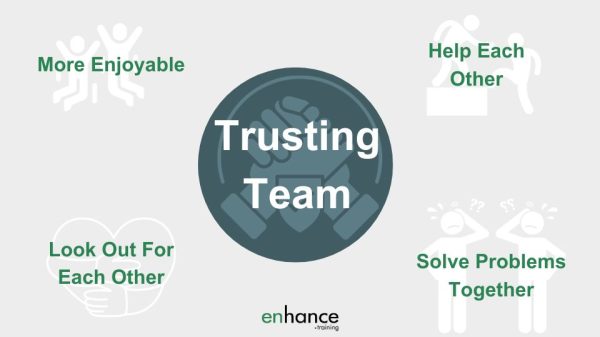Gaining Employee Trust – how to build trust with a team

Why is trust important in the workplace? Gaining employee trust is an essential step to building a team. Teams outperform groups of individuals hands down. When you build trust within your team, the working environment becomes more enjoyable for all, team members look out for each other, help each other and tackle problems together.
All these benefits increase team performance and reduces staff turnover, reducing the cost of recruiting and training new staff. Every company wants better performance for lower cost. If you are the manager delivering this, what would the company do for you?
Gaining Employee Trust – how to build trust with a team
- Understand two different types of trust
- Listen and act for gaining staff trust
- Empowering your employees is trust in action
- Consistency of action creates trust
- Openness and transparency builds trust
- Trust is created when leading by example
- Act for the benefit of your team to gain trust
I don’t think that you can employ tricks or short term tactics in winning the team’s trust at work. Booking in days of team building exercises and trust building exercises rarely moves the trust dial much. Building trust takes work, being genuine, showing who you are and it doesn’t happen overnight.
All of the approaches I talk about need to be employed from the heart, from a genuine and honest desire to help and support your team members. If you approach them as techniques to employ for winning the teams trust rather than seeking to build genuine two way trust, they simply won’t work.
A manager needs the team’s trust to enable their own success. A manager creates value through others, through their team. Their team’s performance is a key way a manager’s personal performance will be judged. To gain the trust of a team, a manager should lead the way and trust their team members first.
Watch on YouTube
Listen on Podcast
Understand two different types of trust
Everyone is different, and we each place more value on one type of trust compared to the other. Two different types of trust in the workplace:
1. Job based trust
Job based trust or cognitive trust is your trust in a person to do their job well, to undertake an activity and do it well. This trust is important in teams when everyone is relying on their team mates to do their tasks and jobs at least as well as themselves.
2. Relationship based trust
Relationship based trust or affective trust is built on empathy, emotional connection and genuine feelings of concern and care. Our feelings about the other persons intentions, values and integrity all feed into this type of trust.
Relationship trust in action is when say a friend has had a really bad day, you sit and listen without trying fix the situation, as they blow off steam. Even though you had an amazing day, you don’t breathe a word about it. A demonstration of putting their interests before yours.
Building both types of trust are important in the workplace. Some place more value on job based trust, others on relationship based trust. Who wants to follow a leader that is a liability in their job. Equally, who enjoys having a manager great at the technical side of their job, but who you don’t trust to look after you in the slightest.
In winning employee trust, you need to build both relationship and job-based trust.

The second action is to Listen and Act for gaining staff trust
Listening to team members – that is hearing what they say, taking it in and understanding it – is a good demonstration that you value their input, ideas, and solutions. Acting on at least some of those ideas is even more important. Acting on their ideas and input is a visible public vote of confidence and trust in them.
The best way to kill off staff giving you ideas is to do nothing. You will also kill off some trust by doing nothing.
Listening to staff and visibly acting on the good ideas and solutions will build trust with team members and demonstrate you care and value them. Listen and act.

The third action to winning the teams trust at work is empowering your employees
Empowering staff is a demonstration of your trust of your employees. If you don’t show you trust your team members, why do you expect them to trust you? Extend trust to earn trust back.
Trust your team members to do their job. Give them clear direction, set clear expectations, and then stay out of their way.
Don’t:
- Micromanage them, be overly controlling or check up on them every 5 minutes
- Don’t only set them tasks, which limits them practicing their problem solving, organization and general thinking
- Ignore their ideas, input or solutions
Do
- Stay out of their way, so they can do their jobs
- Delegate problems to those capable of solving them and delegate problems and coach those that can almost solve the problems
- Do Ask for their opinions, ideas, and solutions and act on them
- Ask for their help to solve problems relating to their areas or impacting the broader team
- Invite them into group problem solving or planning sessions
There are so many ways you can empower employees and show team members that you value them, respect their skills and want to hear their ideas.

Fourth is Consistency of action creates trust
In any leadership position consistency is a big deal in creating emotional safety and trust with your employees. Humans love patterns. Our brains are wired to recognise and use patterns as it saves our brains a lot of energy, and patterns are also key in our survival mechanisms. Creating consistent patterns creates psychological safety.
In contrast – I watched a leader at work one day give a prize publicly to one of his team members and then about three weeks later suddenly fire that same person. What message did that set of actions send to everyone in that leaders’ team. I had several very worried afraid people talk to me about it afterwards.
Consistency of actions, decision making and behaviours all build trust. Employees know that in a given situation, the action you as a manager will take is likely to be X or something close.
This consistency extends psychological safety to your employees and builds trust in you, because they know what to expect.
Fifth, openness and transparency builds trust with employees
In the workplace, being open and transparent allows employees to form their own opinions based on the same information you are looking at. When they reach the same or similar conclusions and agree the action you plan makes sense, you start gaining staff trust quickly.
I spoke to the owner of a very unionised business in declining sector. There was a lot of distrust between the union and management. The union was pushing for higher pay. Management was trying to keep the business alive. As soon as the management opened the books, showed the workers and the union the finances, the budget and talked through their plans, all the animosity and distrusted dropped away. Both management and workers started working as a team for the first time in decades.
So regularly share with your team:
- The financial targets and progress against them for both company and the team
- Talk through what is happening the company, why it will help hit targets and what and how the team can contribute.
- Discuss the problems and challenges being faced by the team and the business.
- Explain everyone’s responsibilities on the team and who is doing what and why
- Tell the team your personal thoughts and views when appropriate rather than just repeating the corporate messaging.
Being open and transparent is incredibly powerful to building trust with your team.
Sixth, Trust is created when leading by example
As a leader or manager, what you do is in the spotlight all of the time. Every action, decision and behaviour are observed by staff members and impacts their trust of you. How you treat team members and colleagues impacts their trust of you.
Create trust by Living the same rules you are asking your staff to live by. Being open and transparent shows that you are accountable in the same way you are asking your staff to be. Work to hit your personal targets and well as helping the team overall hit their targets.
Treat others how you want to be treated. Give them the trust and respect you want back in return.
In short, lead by example and do this consistently day in day out to build trust with employees.

Seventh, Act for the benefit of your team to gain trust
One of the most powerful ways for how to build trust within your team – that I know – is visibly working hard to help your team. A few suggestions:
- Deal with the problematic people or behaviours on the team
- Protect the team from distractions, politics, low value requests and the games other managers play
- Create clear direction and keep yourself and the team focused on that direction
- Actively look for and remove problems that hamper your team members efforts and success
- Work hard to help your team members develop relevant skills and broaden their experience
A big part of being a successful manager or leader is acting in service to your team. By actively and visibility using all the skills and experience at your disposal to help the team overall, you are showing you are doing your best, your part in creating the team’s success. Serving your team is a brilliant way of winning team trust.
in summary
Gaining employee trust and working out how to build trust within your team in a genuine open and empathetic way is incredibly important as a manager or leader. Without trust, you don’t have a team, only a collection of individuals. A team will outperform a group of individuals any day. Your key job as a manager is to increase team performance. Encourage trust with your team using the 7 actions we have discussed. Building a higher performing team starts with building trust with your team and within your team.
To recap we have been through these 7 steps to gain the trust of your team:
- Understand two different types of trust
- Listen and act for gaining staff trust
- Empowering your employees is trust in action
- Consistency of action creates trust
- Openness and transparency build trust
- Trust is created when leading by example
- Act for the benefit of your team to gain trust
If you have any questions on “Gaining Employee Trust – how to build trust with a team”, please email me at support@enhance.training and I will get back to you.

Building trust with a team as quickly as you is one of the most important factors I have found in building higher performing teams. If you trust your team and they trust you and each other, then every communicates more, supports each other more and has more fun. Improved team performance follows.
Trust you team and show that you trust them. You will get back trust in return. Show trust first before expecting your team to follow. Be patient and keep persisting.





